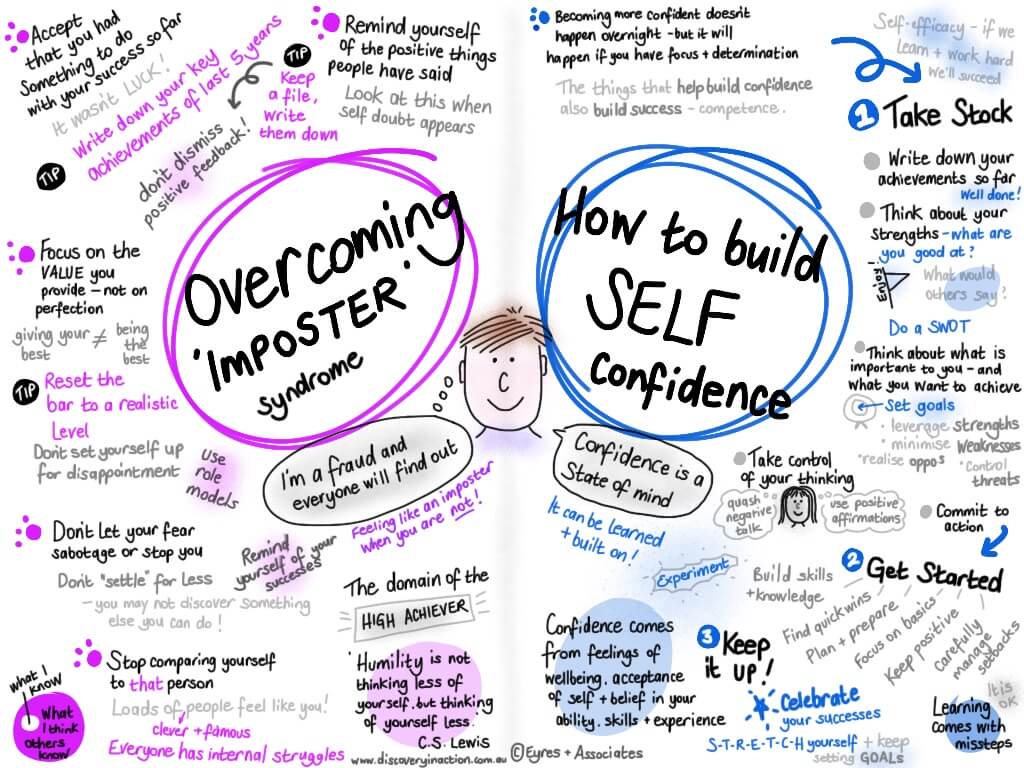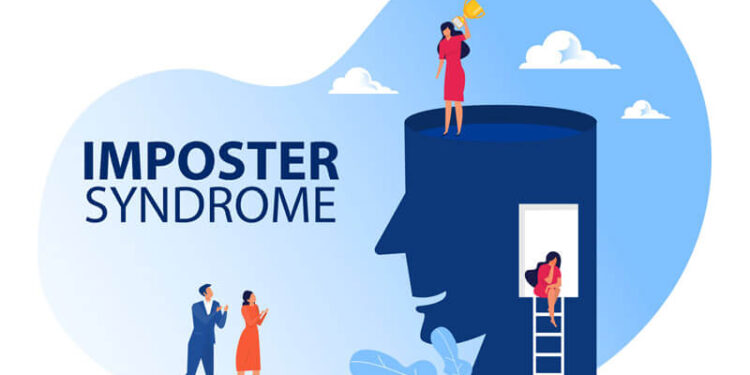Imposter Syndrome manifests in different ways, with various types including the Perfectionist, the Superwoman/man, the Natural Genius, the Soloist, and the Expert. Each type is characterized by distinct thought patterns and behaviors that contribute to self-doubt.
CALIFORNIA, UNITED STATES | NOW THEN DIGITAL — Even intelligent, successful people sometimes struggle with feelings of being an Impostor Syndrome fraudster. But don’t despair: there are ways you can combat such falsely self-limiting thoughts and start living life more confidently!
Step one is recognizing your emotions and when they arise; then work on strategies for dealing with them.
It’s essential to remember that overcoming Imposter Syndrome is a process that takes time. Being patient and supportive as individuals work towards building confidence in their abilities is crucial. By fostering a supportive environment and providing the necessary encouragement, we can help others overcome self-doubt and unlock their full potential.
Understanding Imposter Syndrome: Key Points to Know

Imposter Syndrome is a psychological phenomenon that leads individuals to doubt their skills, talents, and achievements, harboring an internal fear of being exposed as frauds.
Despite external evidence of their competence, those affected by this syndrome persistently believe they are undeserving of their success.
Here are some important aspects to consider:
Types of Imposter Syndrome
Imposter Syndrome manifests in various forms, including the Perfectionist, the Superwoman/Man, the Natural Genius, the Soloist, and the Expert.
Each type is characterized by distinct patterns of self-doubt and feelings of inadequacy.
Causes and Effects
Imposter Syndrome can be triggered by different events such as recognition for success, receiving awards, passing exams, or being promoted. Paradoxically, failure after a series of achievements can also contribute to questioning one’s overall abilities.
This pattern of thinking often leads to a critique of oneself and a persistent questioning of one’s aptitude.
The Link to Perfectionism
Imposter Syndrome is closely intertwined with perfectionism. Individuals affected by this syndrome feel an intense pressure to perform flawlessly at all times. When they fall short of their own high standards, they perceive themselves as incompetent, leading to anxiety and self-doubt.
Overcoming Imposter Syndrome
To alleviate feelings of Imposter Syndrome, seeking support from trusted individuals or mental health professionals can be helpful. Recognizing and acknowledging personal accomplishments is vital in combating this syndrome and giving oneself credit for success.
The Impact on Mental Health
Imposter Syndrome can have a detrimental effect on mental well-being. Those experiencing it often struggle with anxiety and depression, particularly among Black, Asian, and Latino college students.
The pressure to consistently perform at a high level can lead to emotional strain and hinder overall performance.
Furthermore, Imposter Syndrome can create a cycle of missed opportunities and isolation, amplifying negative consequences.
Supporting Someone with Imposter Syndrome
Supporting individuals grappling with Imposter Syndrome requires empathy and understanding. Here are some suggestions:
- Challenge negative self-talk: Challenge vague self-deprecating comments by offering evidence of their accomplishments.
- Encourage self-recognition: Help them identify and appreciate their successes, allowing them to give themselves credit.
- Provide specific feedback: Offer genuine and detailed feedback on their work and achievements.
- Normalize the experience: Assure them that Imposter Syndrome is common and that many people encounter it in their lives.
- Suggest seeking help: Recommend consulting a mental health professional or confiding in a trusted person about their feelings.
- Show patience and support: Remember that overcoming Imposter Syndrome is a gradual process, and it may take time for someone to develop confidence in their abilities.
By recognizing and addressing Imposter Syndrome, individuals can overcome self-doubt and unlock their full potential.
How to Overcome Imposter Syndrome

Even highly accomplished professionals sometimes feel like frauds; the good news is that you can learn to overcome these feelings through practice.
To achieve this goal, it’s essential that you distinguish between facts and stories. A fact is an observable truth while stories represent your interpretation of such facts.
Identifying if you are experiencing imposter syndrome
When feeling like an impostor, it is crucial to recognize and overcome it. Anxiety related to impostor syndrome is a self-esteem destroyer and can seriously impede both work and life, ultimately leading to mental health issues and doubting your abilities and even leading to mental breakdowns.
Amy Morin from Therapy Solutions for Women shares some research-backed ways of combatting this syndrome on this episode of the Very Well Mind Podcast with Laura Lavarry who shares additional ways.
Imposter syndrome is a pattern of persistent anxiety that causes you to question your worth and abilities, often when in new or challenging environments. People of all backgrounds can experience impostor feelings at some point in their lives, particularly women from underrepresented groups or high achievers who feel like deserving success but are not fully qualified.
People suffering from impostor syndrome may also be more prone to microaggressions or discrimination which exacerbate these feelings further.
As it’s important to remember, actual fraudsters don’t experience this feeling, it may be a healthy indicator. If it occurs frequently and cannot be shaken off, seeking professional assistance might be worthwhile.
Many factors can contribute to feelings of being an impostor, including family upbringing and trauma, personality traits and anxiety disorders.
People raised in families that oscillated between overpraise and criticism can more readily develop this feeling than others; those suffering from trauma or anxiety or having depression/other mental health disorders are especially likely to feel this way since it can be challenging engaging in positive self-talk.
Understanding that our feelings are irrational is key to breaking free of them, as is finding effective strategies to break their cycle. One effective approach is talking with trusted friends or mentors about your emotions – sharing can help show you are not alone and that other people have similar experiences.
Aside from discussing feelings with others, avoid making comparisons among yourself as this only makes your situation worse – instead focus on making progress toward your goals while celebrating achievements along the way.
Keep in mind that impostor syndrome feelings are temporary and driven by fear, not reality. Implementing strategies such as these will help separate feelings from facts and build your confidence over time.
You will come to appreciate yourself for all you’ve accomplished thus far and eventually realize that you’ve gotten where you are because you are capable and deserving – replacing negative self-talk with positive ones which help curb impostor syndrome symptoms over time.
Building self-confidence

Good news is that building self-confidence can help you overcome impostor syndrome and gain more security in your professional abilities, leading to more positive attitudes toward work and greater effectiveness and productivity at work.
Altering negative internal voices with supportive ones may also prove effective; give these strategies a try – they might work better for some than others but worth giving a shot regardless.
If you feel disempowered in your role, taking stock of what has gone right can help. Writing down all your accomplishments or recalling times when stepping outside your comfort zone paid off can also be useful.
Also take note of all positive feedback received from peers and colleagues; although it might be hard to accept all their compliments at first, writing these down can help reinforce them as genuine comments from them all.
Mindfulness techniques can also help soothe your nervous system and stop dwelling on negative emotions. Such strategies include breathing deeply, using the SBNRR technique for pausing and reevaluating, as well as asking what evidence supports your feelings. You could even write down all your thoughts to compare with past experiences when similar feelings were felt.
Finally, try freeing yourself of restrictive roles that contribute to feeling like an impostor. People experiencing impostor syndrome frequently see themselves as “helpers” or people who can “save the day.” By relinquishing such roles, you may become stronger both personally and professionally.
Additionally, positive feedback from others can help dispel any doubts and build your confidence. This will show that your successes are real without needing to prove anything to anyone – an invaluable lesson if you lead or manage teams with members suffering from impostor syndrome.
At last, you should also seek ways to provide support to team members suffering from impostor syndrome. You could encourage them to speak openly with trusted friends or mentors about how they’re feeling; give constructive feedback that demonstrates you care for their career growth; or offer constructive solutions as necessary.
Finally, provide your team members with opportunities to develop new skills and gain knowledge from others in the group. By doing this, you can reassure your members that they are not alone in dealing with impostor syndrome.
Your support in helping them overcome imposter syndrome lies in addressing any underlying causes that are fuelling it; such as any racial, gender or socio-economic biases which are fuelling these feelings of impostor syndrome.
Seeking professional help
Impostor syndrome is a very real feeling and many people live with it in silence. If you find yourself feeling like an outsider in work or other aspects of your life, seeking professional assistance could help ease this debilitating sensation.
Psychological trauma or anxiety often contribute to this sense of not belonging, with those experiencing posttraumatic stress disorder feeling they don’t belong as others don’t believe in them and hypersensitive nervous systems making negative feedback and internalized criticism even more acutely felt than usual.
If you are experiencing impostor syndrome, it’s important to realize the feelings are real and can have severe repercussions if left unchecked. They can lead to low self-esteem and depression as well as substance use and poor job performance.
Luckily, there are effective strategies available for combatting impostor syndrome: these include getting out of your head, reframing negative self-talk, seeking support from peers as well as practicing mindfulness techniques that slow down thoughts while keeping one focused in the present moment.
Your employer or mentor can also give valuable feedback that can reassure you about your abilities and skills. A therapist can assist in developing a strategy to combat impostor syndrome using one or more techniques – for instance using SBNRR’s Pause/Reevaluate Self Criticism technique can help demonstrate that what might seem like harsh criticism is actually just an inner voice and not factual evidence.
Therapists can also teach coping mechanisms, like journaling or mindfulness. You can try getting out of your head by avoiding rumination – repetitive thoughts. Additionally, practicing self-compassion is key for combatting impostor syndrome and failures should not be taken personally; keep failures in perspective by reminding yourself that it’s rare for anyone to fail spectacularly.
Many high achievers experience “Impostor Syndrome” at some point during their career. This feeling can be particularly burdensome for women and minorities; studies indicate that most individuals suffering from impostor syndrome are women and people of color; this group typically exhibits lower job satisfaction, greater burnout rates, and reduced job security than people without these feelings.
A Word from Blue Moon Senior Counseling
Seeking help for impostor syndrome doesn’t indicate weakness; rather, it shows you’re taking your mental health seriously.
If you or a loved one is feeling intimidated or distressed by social situations or life changes, contact Blue Moon Senior Counseling immediately so we can match you up with a counselor in your area who specializes in counselling for older adults and can identify sources of distress.
Editor’s Note: If you find any of our content to be inaccurate or outdated, please contact us at press@nowthendigital.com
You’re reading nowthendigital.com — which breaks the news about Uganda, Kenya, Nigeria, South Africa and the rest of the world, day after day. Be sure to check out our homepage for all the latest news, and follow NOW THEN DIGITAL on YouTube, Google, Web Stories, Google News, Medium, LinkedIn, Twitter, Reddit, Pinterest, Linktr, Buy Me a Coffee, and Flipboard to stay in the loop.

















